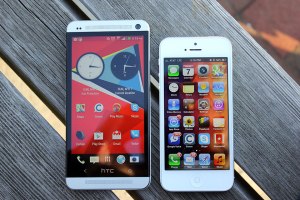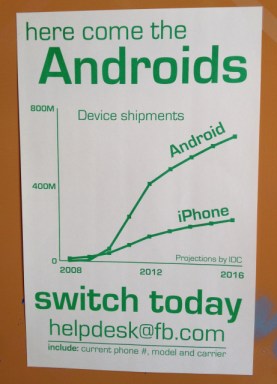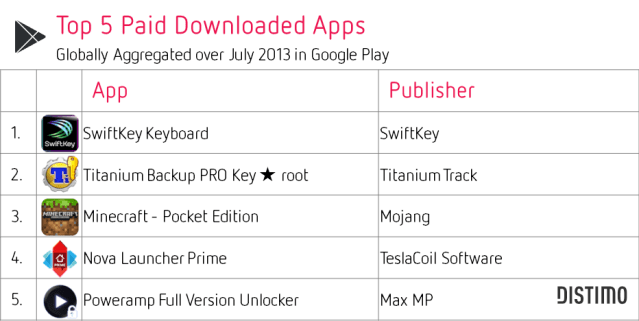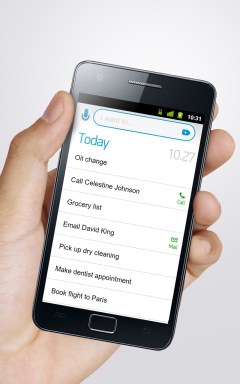In a must-read post for the tech industry, Twitter experience designer and serial startup founder Paul Stamatiou writes: “Android is Better.” His op-ed serves as something of a wake-up call for the industry, where developers building the next generation of mobile applications still heavily prefer the iPhone, not only as their personal smartphone of choice, but also as the launch platform for their latest creations.
Many who have already heeded Android’s siren song found themselves nodding along to nearly every point Stamatiou made, ranging from the minor details, like how Android handles notifications, to broader statements about Android’s “magical user experience,” which involves the use of a global back button, Google Now integration and Android intents for app-to-app interoperability and communication. While obviously an opinion piece, Stamatiou’s thoughts came across as reasoned and well-argued, and didn’t at all resemble the fanboy-ish op-eds often published to incite religious wars between the iPhone and Android zealots for website traffic’s sake.
Many who have already heeded Android’s siren song found themselves nodding along to nearly every point Stamatiou made, ranging from the minor details, like how Android handles notifications, to broader statements about Android’s “magical user experience,” which involves the use of a global back button, Google Now integration and Android intents for app-to-app interoperability and communication. While obviously an opinion piece, Stamatiou’s thoughts came across as reasoned and well-argued, and didn’t at all resemble the fanboy-ish op-eds often published to incite religious wars between the iPhone and Android zealots for website traffic’s sake.
Most Tech Companies Are Still iOS-First
Having recently made the switch from the iPhone 5 to the Nexus 4 and then back to the iPhone 5 myself, the pro-Android argument struck a personal chord. It’s at least the third time I’ve attempted to leave the iPhone. For all the same reasons, I too had found myself again falling in love with the Android operating system. But there’s one thing that keeps pulling me back to iPhone: the apps.
As an early adopter, and technology enthusiast in general — a mindset TechCrunch readers probably share — being solely on Android can be a frustrating experience. Today’s tech companies are still launching their mobile applications on iOS first. This includes apps from the smallest of startups to some of the largest, like Twitter, which launched its video-sharing app Vine as well as Twitter Music on iPhone first (the latter of which is not yet on Android, four months after its debut).
Having recently made the switch from the iPhone 5 to the Nexus 4 and then back to the iPhone 5 myself, the pro-Android argument struck a personal chord. It’s at least the third time I’ve attempted to leave the iPhone. For all the same reasons, I too had found myself again falling in love with the Android operating system. But there’s one thing that keeps pulling me back to iPhone: the apps.
As an early adopter, and technology enthusiast in general — a mindset TechCrunch readers probably share — being solely on Android can be a frustrating experience. Today’s tech companies are still launching their mobile applications on iOS first. This includes apps from the smallest of startups to some of the largest, like Twitter, which launched its video-sharing app Vine as well as Twitter Music on iPhone first (the latter of which is not yet on Android, four months after its debut).
The iOS-first mentality is so ingrained in the culture of the tech and startup scene, in fact, that Facebook had once plastered large signs around its offices begging employees to switch to Android. Later, the company released its own take on what Android users supposedly want with “Facebook Home,” an Android launcher that quickly tanked. Had Facebookers understood the true ethos of Android, they would have perhaps realized that Android users favor the customization and personalization aspects of the platform. Meanwhile, Facebook Home was a full-on takeover of the entire Android interface and experience, with little wiggle room to change much of anything about its behavior.
If you look at Android’s top charts, you’ll find they’re continually filled with apps that let users tweak, customize, and better control their Android devices. For instance, in July of this year, the top five paid Android apps included a keyboard replacement (Swiftkey) in the No. 1 position, a fairly geeky utility for users who had rooted their phones (Titanium Backup) in the No. 2 position, and an alternative launcher (Nova) as No. 4, according to analytics firm Distimo.
If you look at Android’s top charts, you’ll find they’re continually filled with apps that let users tweak, customize, and better control their Android devices. For instance, in July of this year, the top five paid Android apps included a keyboard replacement (Swiftkey) in the No. 1 position, a fairly geeky utility for users who had rooted their phones (Titanium Backup) in the No. 2 position, and an alternative launcher (Nova) as No. 4, according to analytics firm Distimo.
The constant tweaking and customizing is fun, but at some point, it becomes just another way to pass the time while waiting for the latest and greatest new application to make its way to Android. You know – eventually.
This is not the story you’ll hear from headstrong Android devotees who point to the sheer number of Android apps available today. Of course, it’s true that the Apple and Android app stores are roughly close in terms of the numbers of applications offered, and have been for some time. There are over 900,000 iOS applications, while analysts estimated as of May there are over 800,000 Android apps available. It’s not that there aren’t enough Android apps out there. There just aren’t the brand-new ones early adopters might want — those from startups you may read about here on TechCrunch, for example. Those almost invariably go iOS-first.
This is not the story you’ll hear from headstrong Android devotees who point to the sheer number of Android apps available today. Of course, it’s true that the Apple and Android app stores are roughly close in terms of the numbers of applications offered, and have been for some time. There are over 900,000 iOS applications, while analysts estimated as of May there are over 800,000 Android apps available. It’s not that there aren’t enough Android apps out there. There just aren’t the brand-new ones early adopters might want — those from startups you may read about here on TechCrunch, for example. Those almost invariably go iOS-first.
It’s hard to even think of tech companies that launched on Android first in recent months, but there are a few. Any.DO, a mobile task list app was on Android before iPhone; mobile messenger Invi bet on Android, too. Imgur launched on Android before iPhone, but only because it had to clean itself up a bit, in order to be approved for distribution through iTunes. And Zillow, with what feels like an awkward nod to the demographics of Android users, launched its Rentals app on Android first last fall. (These are off the top of my head. I asked on Twitter, and a few responses trickled in, including Smoopa and … um, does Google Now count?)
To be clear, there are certainly many, many Android applications that aren’t on iOS, but this is mainly the result of developers taking advantage of the Android platform in ways that Apple would not allow. This includes the tweakers and customizers, but also the suite of Google apps that are better baked into Android, such as Google Now. (On iPhone, “Now” is more like a feature within the Google app — a standalone experience.)
To be clear, there are certainly many, many Android applications that aren’t on iOS, but this is mainly the result of developers taking advantage of the Android platform in ways that Apple would not allow. This includes the tweakers and customizers, but also the suite of Google apps that are better baked into Android, such as Google Now. (On iPhone, “Now” is more like a feature within the Google app — a standalone experience.)











0 التعليقات:
Post a Comment